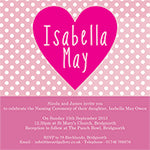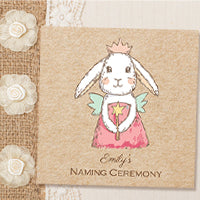
Event Planning
Organising a Baby Naming Ceremony

 A naming ceremony is held to celebrate child’s arrival, regardless of age - this makes them popular with adopting and fostering families too. A ‘celebrant’ leads the ceremony. Parents usually read out special pledges to the child, such as a promise to care for them; supporting adults may do the same. Poetry or prose can be read out. And, of course, there will be an official naming. A few words about the story behind the name adds personal meaning.
A naming ceremony is held to celebrate child’s arrival, regardless of age - this makes them popular with adopting and fostering families too. A ‘celebrant’ leads the ceremony. Parents usually read out special pledges to the child, such as a promise to care for them; supporting adults may do the same. Poetry or prose can be read out. And, of course, there will be an official naming. A few words about the story behind the name adds personal meaning.
Types of Naming Ceremonies
Civil naming ceremonies are a government-led way to mark your child’s arrival. To book one, contact your local Register Office. They are held in a licensed location, and religious content is not allowed. Choosing a civil ceremony means that you won’t have to stress about planning the structure - it is already set out. All you’ll have to do is practise reading your pledges and send out invitations. The Card Gallery has a range of naming ceremony stationery that can be fully personalised. Featured Designs: 'Twins Peeping Toes' and 'Bunny Fairy'
Humanist naming ceremonies are conducted by The British Humanist Association. For a fee, they will provide a celebrant who works with guardians to tailor a ceremony that suits their ideas. They will also lead the ceremony. The venue is not limited, so you can choose your location. The guardians have control over what features they want in the celebration. This allows you to design your dream ceremony. It’s a more expensive option, but you’ll receive professional guidance to help make your own perfect welcoming.
Featured Designs: 'Twins Peeping Toes' and 'Bunny Fairy'
Humanist naming ceremonies are conducted by The British Humanist Association. For a fee, they will provide a celebrant who works with guardians to tailor a ceremony that suits their ideas. They will also lead the ceremony. The venue is not limited, so you can choose your location. The guardians have control over what features they want in the celebration. This allows you to design your dream ceremony. It’s a more expensive option, but you’ll receive professional guidance to help make your own perfect welcoming.
Organise Your Own Ceremony
Remember, naming ceremonies have no legal status. But they are a great way of celebrating a memorable milestone. So why not simply organise a party yourself? Invite friends and relatives to celebrate the arrival of your new family member. Plan promises, speeches, or readings you want to give, and practise them so you’re confident on the day. A great list of poems can be found here if you need some inspiration! You could make refreshments for guests to give the day a celebratory atmosphere, as well as decorating with some bunting and confetti. You could even choose a theme that suits your child’s name, like matching a garden party to a floral name. Featured Designs: 'Singing Birds Postcard' and 'Rose Bud'
Naming ceremonies are a great alternative to traditional christenings. The day can be as formal or as relaxed as you want! And you can choose your own budget, either opting to spend more for some extra help, or arranging the ceremony yourself. Whatever you choose, it’s sure to be a memorable day for all.
Featured Designs: 'Singing Birds Postcard' and 'Rose Bud'
Naming ceremonies are a great alternative to traditional christenings. The day can be as formal or as relaxed as you want! And you can choose your own budget, either opting to spend more for some extra help, or arranging the ceremony yourself. Whatever you choose, it’s sure to be a memorable day for all.

Your Naming Ceremony Questions Answered

Can you have religious references at a Naming Ceremony? By all means, if there are religious readings or references that have special meaning for you, you should include them in your ceremony.
Is there an official certificate for a Naming Ceremony? Usually a commemorative certificate will be signed during your ceremony. If you would like additional certificates i.e. Supporting Adult Promises and Grandparents' Promises, you can find companies who provide these online. Who can arrange a Naming Ceremony? Any parent can make the arrangements to hold a Naming Ceremony. Likewise, anyone who has parental responsibility or legal guardianship of the child/ren can also arrange it. Parents do not have to be married and can come from any cultural background, with any spiritual or religious beliefs or with none. When can Naming Ceremonies be held? Ceremonies can be conducted at any time that is convenient to both you and the Celebrant (the official registrar). Alternatively, you can purchase or look up scripts online and a friend or family member can conduct the ceremony for you. How long does a Naming Ceremony last? This depends on how much you choose to include. Most naming ceremonies generally last between twenty and twenty five minutes. Remember that the ceremony itself can be part of a potentially much bigger family event, and there are countless additional activities you can arrange to enhance the overall success of the whole day. Can we organise a Naming ceremony at short notice? A naming ceremony can be arranged within a few weeks but it can take a lot longer to organise, depending on what you wish to include. We would always advise that it is best to plan your ceremony as far in advance as possible so you have lots of time to send out your naming ceremony invitations and aren’t stressed out with last-minute arrangements.
Writing a Naming Ceremony Speech
A Naming Ceremony is a really important moment in your child's life – and an important memory for the family as a whole. It is the moment that you officially welcome a new person into the family in front of everyone you love, and a lot of people choose to give speeches at a Naming Ceremony. If this is something that you plan on doing, here's our guide to writing a Naming Ceremony speech for you little one's special day.
First off (and just like a wedding!) you should thank everyone for coming to the event. Give special thanks to anyone who has had to come a long way to be with you. It is also a good idea to thank the priest or celebrant for the ceremony that he/she has delivered.
Next up, say a little something about how important it was for you to have a naming ceremony for your child, and also how special it was that your child is now a part of your life. Don't forget any existing children that you may have - it's very easy to get jealous when a whole day is being dedicated to their new sibling! Give them a special mention and tell them how well they are doing at being a new big brother/sister.
Once everyone has been mentioned in some way, you should then mention about your hopes for your child's future, and wishing or praying over them for happiness and health. Make reference to how everyone there with you can help this new little person to grow and thrive in your family.
Lastly, ask everyone to raise their glasses and toast to the child’s future health and happiness.



